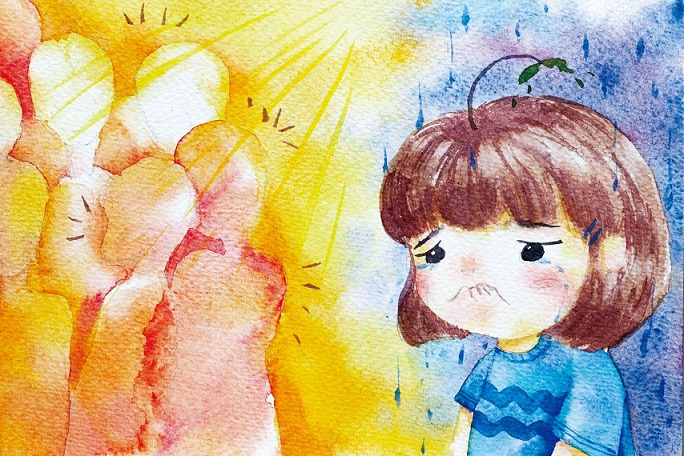I’m Worried that My Child Has No Friends…
By Li Qiu-yue (李秋月)
Illustration by Zhong Ting-jia (鍾庭嘉)
Translated by Andrew Huang (黃執虔)
Syharn Shen (沈思含)
I’m Worried that My Child Has No Friends…
By Li Qiu-yue (李秋月)
Illustration by Zhong Ting-jia (鍾庭嘉)
Translated by
Andrew Huang (黃執虔)
Syharn Shen (沈思含)

Q: My child doesn’t have friends in school. Can I do something about it?
A: When your child has no friends, it’s natural that the parents will worry and want to do something about it. Please don’t! Sometimes the situation may be simple at first, but turn complicated once the parents get involved, and as a result, your child may be even more disliked by their peers.
How can parents help their child face frustrations and troubles in interpersonal relationships? Here are some ways that parents can try:
1) Clarify the situation with your child
You can ask your child in what circumstances does no one want to be with them. Is it when groups are formed in class and no one wants them to join their group? Or is it during breaks when no one wants to play with them? Or could it be that someone intentionally stops others from becoming their friend? When your child is telling you their experience, don’t rush to make conclusions or recommend solutions. Listen closely first and then ask your child what they plan to do in this situation. With your guidance and through verbalizing their experience, your child may have already come up with a solution.
2) Give empathy to your child
When your child is willing to open up about their pain, it means that they have already struggled with it for a while. You can comfort your child with hugs, and for an older child, you can give them a pat on the shoulder, tell them not to worry, and reassure them that mom and dad will always be there for them.
Never comment and correct what they’ve done in the past. Don’t tell your child: “I’ve told you not to play with that someone, but you just didn’t listen.” “You should have brought candies and cookies for the whole class on your birthday, but you didn’t want to. Now you see how things turned out…” If you deal with the situation this way, your child will simply stop talking and never tell you about their troubles again. If this happens, you’ll not be able to support and nourish your child as they grow up.
3) Help your child to face bullying
In interpersonal relationships, bullying is an issue that is the most serious and the hardest to deal with. Bullying can be grouped into the following types:
Verbal bullying: such as name-calling and using words to hurt, ridicule, intimidate, or threat someone
Relational aggression: such as slandering, spreading rumors, and excluding someone from a group
Sexual bullying: such as making fun of or commenting on someone’s body, gender, sexual orientation or sexual characteristics, and sexual assault
Physical bullying: such as kicking, hitting, and other forms of physical attack, and robbing someone of their possessions
Cyberbullying: such as texting, using social media or the Internet to attack someone, and spreading false rumors and accusations
When your child has been bullied, try to find out which type of bullying it is. Give your support and empathy, and tell your child, “Don’t stay silent and seek help from your homeroom teacher. Tell yourself: 'It’s not my fault, it’s the bully who’s wrong'. Stay close to the crowd so the bully has no chance to harm you. Since bullies like to target the weak, show positive energy and display confidence so the bully will have no way to pick on you.”
Back when I taught in high school, there was a student who wasn’t popular with his peers. I discovered that he had trouble speaking clearly and was afraid of being laughed at by his classmates, so he kept himself away from others. I secretly made some arrangements so he could interact more with others. For example, I asked a student who was very friendly to invite him to join their group in culinary class. I also told them that I want to try out the dish that he cooked. After making his dish, he came to me with his face blushing, and stammered to ask me to try his dish. Despite having my hands full of chalk, I took his dish, ate the whole plate, and mumbled, “That’s delicious!” His face was still red, but brimmed with a smile. I knew then than he was on the road to having better interpersonal relationships!
Dear parents, if you want your child to have good interpersonal relationships and overcome the problems they encounter, you need to let go of your control and fully support your child with love and care. This is what parents should do. As for the rest, allow space for your child to explore and grow on their own.
(Source of information on bullying: Ministry of Education’s Prevention and Control of Bullying on Campuses)
Contact Us | Plan a Visit | Donate
8 Lide Road, Beitou 11259, Taipei, Taiwan
886-2-2898-9999
005741@daaitv.com
©Tzu Chi Culture and Communication Foundation
All rights reserved.
